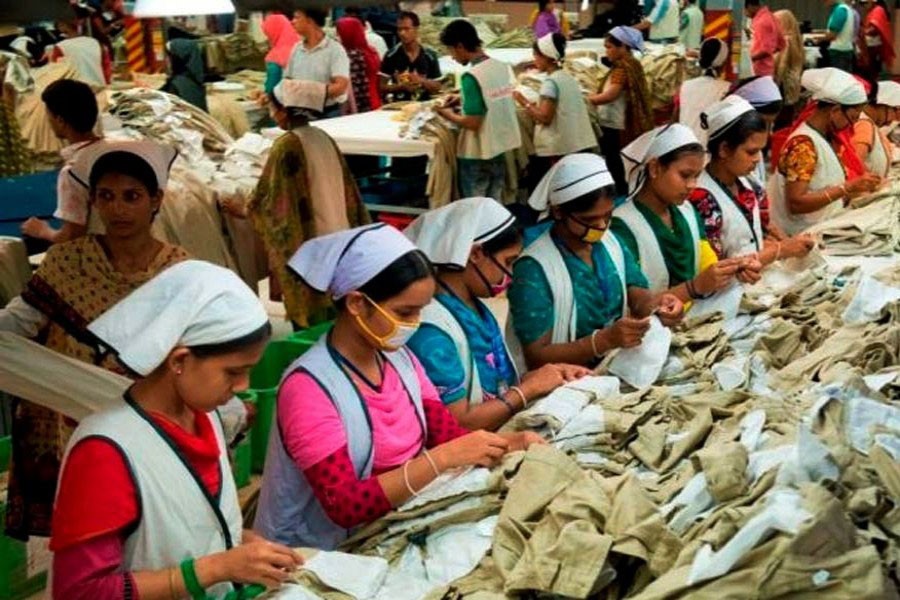
Published :
Updated :

A visiting delegation of the European Union (EU) pressed the government on Wednesday for a time-bound action plan to address their concerns related to labour rights situation in the country to retain the trade benefits under its EBA (Everything but Arms) initiative.
In a meeting with top officials of ministries of commerce and labour, the EU EBA technical mission also recommended Bangladesh to withdraw all criminal charges against workers in last December and this January over their wage-related protests, meeting sources said.
The delegation members during their three-day visit on October 14-16 had held meetings with leaders of different rights groups and ready-made garment (RMG) sector trade-bodies.
They discussed the latest labour law reforms in Bangladesh and collect necessary information to report on development and progress made in the remaining issues in the forthcoming biennial Generalised Scheme of Preferences (GSP) report for the European Parliament and the EU member states.
The EU delegation urged the government to allow trade unions instead of workers welfare associations as well as assessment by labour inspectors without prior approval from the Bangladesh Export Processing Zones Authority (BEPZA) in the factories in its eight EPZs, the sources also said.
The visiting delegation also wanted further amendments to the labour law and labour rules in line with the International Labour Organization (ILO) Convention 87 concerning freedom of association and protection of the right to organise along with Convention 98 regarding right to organise and to bargain collectively.
The EU team also asked for reduction of minimum membership threshold for trade union registration to 10 per cent, which has recently been fixed at 20 per cent from the previous 30 per cent, they added.
A labour ministry official said the delegation recommended Bangladesh to ratify ILO Convention 138 on minimum age for union registration to 10 per cent, which has recently been fixed at 20 per cent from the previous 30 per cent, they added.
A labour ministry official said the delegation recommended Bangladesh to ratify ILO Convention 138 on minimum age for employment.
In the meeting, labour secretary K M Ali Azam informed the mission about the progress related to amending labour law, move to revising labour rules, and updates on Bangladesh EPZ Labour Act, trade union registration, anti-union discrimination and measures to eliminate forced labour and child labour.
Regarding termination of workers over various reasons, the ministry informed them that the termination of the workers was in accordance with the labour law, and the workers were paid as per provisions of the law.
"No one had gone without wages and other benefits. We have not found any unresolved cases regarding the workers' dues," said an official.
Regarding criminal charges against workers, the ministry officials said they are working with the RMG sector trade-bodies, employers' federation, workers' unions and federations, and law-enforcers for resolving the case-related issues.
They also said 36 cases were filed by the employers against the workers in connection with the minimum wage-related incidents in 2018. Other three cases were filed by the Dhaka Metropolitan Police (DMP) for vandalism, blocking roads and destroying public properties. Some 11 cases have been withdrawn, and the rest will be resolved in coming days, they added.
Regarding ILO Convention 138, the labour secretary said except it, Bangladesh ratified seven out of eight ILO core conventions, and his ministry has been engaged with the ILO and other partners regarding this issue.
The government is working to eliminate all forms of child labour from the country by 2025, and a new project has already been taken in this regard, he added.
Terming the EU's EBA initiative instrumental for Bangladesh's economy, commerce secretary Md Jafar Uddin sought support from the delegation to secure GSP Plus benefit there after Bangladesh graduates to a developing country.
Around 1,200 factories were closed in last five years due to lack of apparel demand amid global slowdown along with unhealthy competition due to continuous price cutting efforts of buyers and retailers, he noted.
munni_fe@yahoo.com


 For all latest news, follow The Financial Express Google News channel.
For all latest news, follow The Financial Express Google News channel.